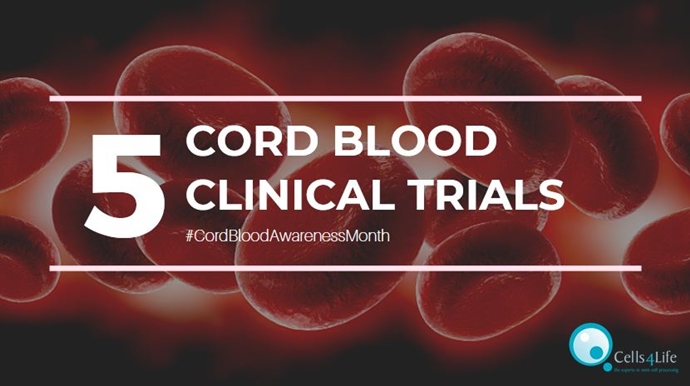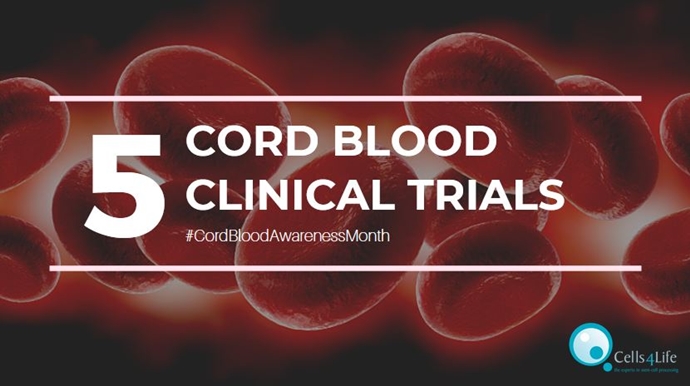
Researchers continue to discover new applications for the stem cells found in umbilical cord blood. Some of these discoveries have the potential to completely change how many common illnesses are treated. This article will highlight 5 very promising cord blood trials and their future benefits.
Assessment of the Safety of Allogeneic Umbilical Cord Blood Infusions in Children with Cerebral Palsy
This trial will assess the use of umbilical cord stem cells for treating children with cerebral palsy. It will use stem cells sourced from the siblings of 15 participants between the ages of 1 and 6. Six of the participants will receive HLA-matched stem cells from a sibling and the remaining nine will receive HLA-mismatched stem cells from a sibling. The study will last for 6-months after the initial cord blood infusions take place.
The primary objective of this research project is to assess the safety of stem cell transplants from siblings, for children with cerebral palsy. It will assess any incidences of reactions, infections, or graft vs host disease (GvHD) amongst the participants. If this research project is successful, it may lead to a potential cord blood stem cell treatment for cerebral palsy.
Cells4Life is excited to be playing a role in this trial by raising funds to help Jay Shetty, a young boy with cerebral palsy who is participating in this trial. You can read more about Jay’s story here.
Learn More » https://clinicaltrials.gov/ct2/show/study/NCT02599207
Cord Blood Infusion for Children With Autism Spectrum Disorder (Duke ACT)
This randomised, double-blind study is testing the effectiveness and safety of cord blood infusions for treating Autism Spectrum Disorder (ASD). The researchers will split a small group of children between the ages of 2 and 7 with ASD into two groups.
Group A will receive a single infusion of cord blood stem cells, followed by a single infusion of a placebo six months later. Group B will receive an infusion of a placebo followed by an infusion of cord blood stem cells six months later.
All participants will receive autologous cord blood stem cells (which come from their own body) or a transplant of HLA-matched allogenic cord blood stem cells. The research team will assess the results of the transplants 6-months after the initial transfusion, then again six months later.
This research project will help researchers understand if cord blood is effective at treating ASD in young children.
Learn More » https://clinicaltrials.gov/ct2/show/NCT02847182
Umbilical Cord Transplantation for the Elderly Population
This study is going to assess the safety of using cord blood stem cells to treat elderly patients with cancer or marrow failure syndromes (blood disorders). Researchers are going to incorporate cord blood stem cells with an intensive predatory regime in the hopes of decreasing relapses. If this research project is a success, it may help save the lives of many elderly people with cancer or blood disorders.
Learn More » https://clinicaltrials.gov/ct2/show/NCT01484470
Stem Cells in Umbilical Blood Infusion for CP (SCUBI-CP)
This Australian study is going to test the safety and efficacy of using cord blood stem cells on children with cerebral palsy. It is going to a use a total of 12 participants across Australia. Each participant will receive an infusion of cord blood stem cells from a 12/12 HLA-matched sibling. If this trial is a success it will demonstrate the safety of using cord blood stem cells for treating cerebral palsy and help researchers move forward with further trials.
Learn More » https://clinicaltrials.gov/ct2/show/NCT03087110
Study of Allogeneic Umbilical Cord Blood Infusion for Adults With Ischemic Stroke (CoBIS 2)
A number of research projects have indicated that cord blood stem cells may useful for repairing damage to the brain after a stroke. This study will look at the effectiveness of a single intravenous injection of cord blood stem cells from an unrelated donor for treating ischaemic stroke.
Participants will receive a transfusion of umbilical cord blood or a placebo 3 to 10 days after having a stroke. They will also receive immunosuppressive medications to help the transfusion succeed. The researchers will follow the subjects for a year to determine the success of the transfusion.
If this research project is a success, it may lead to a cord blood stem cell treatment for people who have suffered a stroke — potentially helping millions of people each year.
Learn More » https://clinicaltrials.gov/ct2/show/NCT03004976
{{cta(‘d59882b5-74e2-4033-be94-d4c340e1978c’)}}


